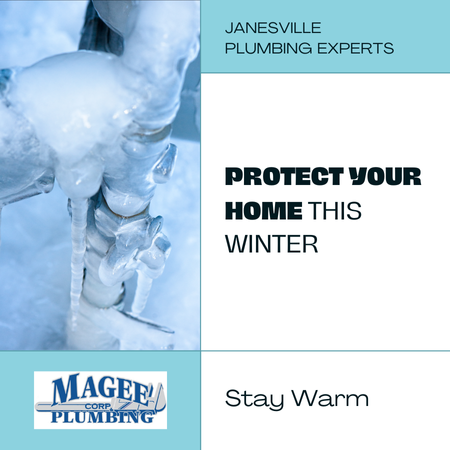Prevent Frozen Pipes: Essential Winter Plumbing Tips for Janesville Homes
Winter in Janesville brings freezing temperatures, and with that comes the risk of frozen pipes. When water in your pipes freezes, it expands, which can lead to burst pipes, water damage, and costly repairs. At Magee Plumbing, we’re here to help you prevent frozen pipes this winter with proactive tips and expert advice. By following these simple steps, you can protect your home and avoid an emergency situation. And if you ever need assistance, call Matt at Magee Plumbing for expert service.
Use a Strainer in Your Kitchen Sink
Using a sink strainer is a simple yet effective way to prevent food particles from going down the drain. A strainer catches food scraps, which you can then easily dispose of in the trash. Make it a habit to use a strainer, especially during parties when food preparation is at its peak. Regularly empty the strainer to ensure it doesn’t get too full and compromise its effectiveness.
Why It’s Important to Prevent Frozen Pipes
When the water inside your pipes freezes, it creates pressure that can cause the pipe to crack or burst. This can lead to flooding, water damage, and major plumbing repairs. In Janesville’s freezing winter conditions, pipes in unheated or poorly insulated areas are especially vulnerable. These areas include basements, attics, garages, and exterior walls. Once a pipe bursts, the resulting damage can be expensive to repair—not to mention the hassle of cleanup.
The good news? With a few preventive measures, you can significantly reduce the risk of frozen pipes and keep your home safe during the cold months.
Steps to Prevent Frozen Pipes
1. Insulate Your Pipes Properly
One of the most effective ways to prevent frozen pipes is to insulate them, especially those in colder, unheated areas like basements, crawl spaces, and garages. Foam pipe insulation sleeves are an affordable solution that can be easily installed around exposed pipes to help retain heat.
For pipes at high risk, you can also consider using heat tape or heat cables. These products wrap around pipes and provide warmth, reducing the chances of freezing. They’re especially useful for pipes that run along exterior walls or in areas that are difficult to keep warm.
2. Keep Water Flowing
Allowing a trickle of water to flow from your faucets during extremely cold temperatures can prevent your pipes from freezing. Moving water is less likely to freeze than still water, and the small flow can help relieve pressure in the pipes, reducing the risk of a burst if a section of pipe does freeze.
Be sure to keep both hot and cold taps slightly open, especially in sinks located near exterior walls or in unheated spaces. This simple trick can go a long way in helping you prevent frozen pipes during the coldest winter nights.
3. Seal Off Drafts and Gaps
Cold drafts can easily lower the temperature around your pipes, making it more likely for them to freeze. Inspect your home for drafts around doors, windows, and any gaps in the walls where cold air can seep in. Use caulk or weather stripping to seal these gaps, which will help keep your home warmer and protect your pipes from freezing.
In addition, close garage doors, especially if you have water supply lines running through the garage. Keeping cold air out of vulnerable areas will help you prevent frozen pipes.
4. Open Cabinet Doors
Pipes under sinks are often located in cabinets along exterior walls, where the temperature is cooler. To allow warm air from your home to circulate around these pipes, keep the cabinet doors open during particularly cold days and nights. This simple step can help prevent your pipes from freezing and bursting.
5. Disconnect Outdoor Hoses and Drain Exterior Faucets
Before the first freeze of the season, be sure to disconnect and drain your garden hoses. Leaving hoses connected can trap water in the faucet, leading to ice buildup and pipe damage. Shut off and drain outdoor faucets to prevent frozen pipes in your exterior plumbing. If you have a sprinkler system, make sure it is properly winterized as well.
What to Do If Your Pipes Freeze
Despite your best efforts, pipes can sometimes freeze. If you notice that water flow has slowed to a trickle, it’s possible that your pipes are frozen. Here’s what to do:
- Turn off the main water supply to prevent further damage if the pipe bursts.
- Apply heat to the frozen section of the pipe using a hair dryer, space heater, or heated towels. Never use an open flame to thaw frozen pipes.
- Call Magee Plumbing for assistance. If you’re unable to thaw the pipes or you suspect they’ve burst, it’s crucial to get professional help right away.
Call Magee Plumbing to Prevent Frozen Pipes This Winter
Preventing frozen pipes is essential to avoiding costly repairs and water damage during the cold winter months. At Magee Plumbing, we specialize in helping Janesville homeowners protect their plumbing systems from the cold. Whether you need help insulating your pipes, thawing frozen pipes, or repairing burst pipes, Matt and the team at Magee Plumbing are here to assist you.
Contact Matt at Magee Plumbing today to schedule an inspection or for emergency plumbing services. Don’t wait until it’s too late—take action now to prevent frozen pipes and keep your home safe this winter.
For more tips and professional advice, contact a trusted plumbing expert like Magee Plumbing at 608-921-2553. Let us help you keep your home flowing smoothly all season long!
#WinterPlumbingTips
#PreventFrozenPipes

